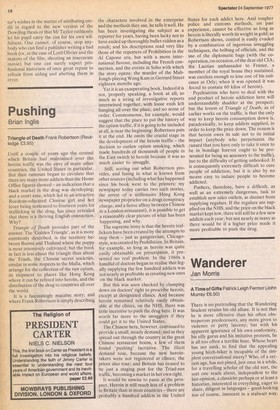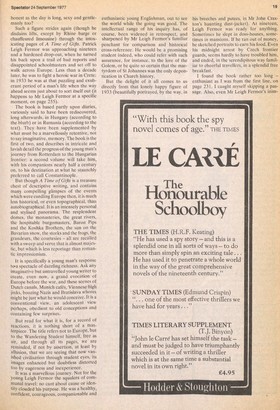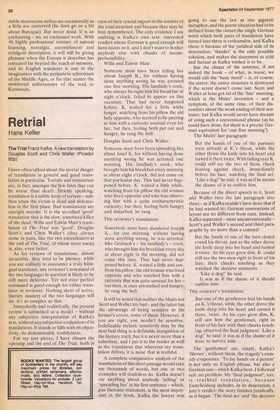Wanderer
Jan Morris
A Time of Gifts Patrick Leigh Fermor (John Murray £6.50) There is no pretending that the Wandering Student retains his old allure. It is not that he is more offensive than his often obstreperous predecessors, any more given to violence or petty larceny; but with his apparent ignorance of his own conformity, his silly gurus and his imitative protests, he is all too often a terrible bore. Whose heart has not sunk, to find that the appealing young hitch-hiker is incapable of the simplest conversational nicety? Who, of a certain age, has not pined, just once in a while, for a travelling scholar of the old sort, the sort one reads about, independent to the last opinion, a classicist perhaps or at least a historian, interested in everything, eager to share, diligent in languages — good-looking too of course, innocent in a stalwart way, honest as the day is long, sexy and gentlemanly too?
Such a figure strides again (though he disdains lifts, except by Rhine barge or chauffeured limousine) through the intoxicating pages of A Time of Gifts. Patrick Leigh Fermor was approaching nineteen and a hardened drop-out, when he turned his back upon a trail of bad reports and disappointed schoolmasters and set off to walk across Europe. Less than a decade later, he was to fight a heroic war in Crete: in 1933 he was at that puzzling and exuberant period of a man's life when the way ahead seems just about to sort itself out (it happens to Mr Leigh Fermor at a specific moment, on page 255).
The book is based partly upon diaries, variously said to have been rediscovered, long afterwards, in Hungary (according to the blurb) or in Rumania (according to the text). They have been supplemented by what must be a marvellously retentive, not to say imaginative, memory. The book is the first of two, and describes in intricate and lavish detail the progress of the young man's journey from Rotterdam to the Hungarian frontier: a second volume will take him, with his companions nearly half a century on, to his destination at what he staunchly preferred to call Constantinople.
But though A Time of Gifts is a treasure chest of descriptive writing, and contains many compelling glimpses of the events which were curdling Europe then, it is much less historical, or even topographical, than autobiographical. It is an intensely personal and stylised panorama. The resplendent domes, the monasteries, the great rivers, the hospitable burgomasters, Baron Pips and the Koshka Brothers, the sun on the Bavarian snow, the storks and the frogs, the grandeurs, the courtesies — all are recalled with a sweep and verve that is almost majestic, but which is less reportage than romantic impressionism.
It is specifically a young man's response to-a spectacle of dazzling richness. Ask any imaginative but untravelled young writer to create, even now, a grand evocation of Europe before the war, and these scenes of Dutch canals, Munich cafés, Viennese high jinks, boozing Nazis and Bratislava whores might be just what he would conceive. It is a conventional view, an adolescent view perhaps, obedient to old conceptions and containing few surprises.
But read for what it is, for a record of reactions, it is nothing short of a masterpiece. The title refers not to Europe, but to the Wandering Student himself, free as air, and through all its pages, we are reminded, if not by assertion, at least by allusion, that we are seeing that now vanished civilisation through student eyes, its images enhanced but doubtless distorted too by eagerness and inexperience. It was a marvellous journey. Not for the Young Leigh Fermor the squalors of communal travel: no cant about cause or identity clouded his purpose. He was a healthy, confident, courageous, companionable and enthusiastic young Englishman, out to see the world while the going was good. The intellectual range of his inquiry has, of course, been widened in retrospect, and sharpened by Mr Leigh Fermor 's familiar penchant for comparison and historical cross-reference. He would be a promising student indeed, who could refer with such assurance, for instance, to the lore of the Golem, or be quite so certain that the martyrdom of St Johannes was the only depontication in Church history.
But the delight of it all comes to us directly from that lonely happy figure of 1933 (beautifully portrayed, by the way, in his breeches and putees, in Mr John Craxton's haunting dust-jacket). At nineteen, Leigh Fermor was ready for anything. Sometimes he slept in doss-houses, sometimes in mansions. If he ran out of money, he sketched portraits to earn his food. Even his midnight arrest by Czech frontier guards, seems hardly to have troubled him, and ended, in the serendipitous way familiar to cheerful travellers, in a splendid free breakfast.
I found the book rather too long — enthusiast as I was from the first line, on page 231. I caught myself skipping a passage. Also, even Mr Leigh Fermor's inim itable mannerism strikes me occasionally as a little too contrived (he does go on a bit about Baroque). But never mind. It is an enchanting — no, an enchanted work. With its highly professional mixture of naiveté learning, nostalgia, astonishment and refulgent description, it will still be giving pleasure when the Europe it describes has retreated far beyond the reach of memory, and its English wanderer is one in the imagination with the peripatetic schoolmen of the Middle Ages, or for that matter the numbered unfortunates of the trail to Katmandu.




































 Previous page
Previous page